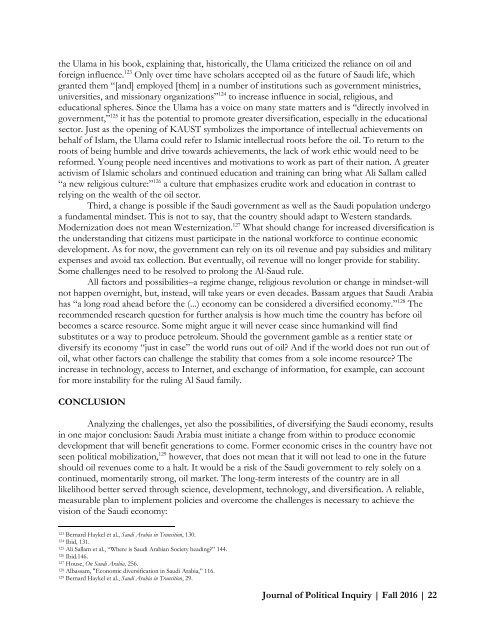Fall2016_Final
Create successful ePaper yourself
Turn your PDF publications into a flip-book with our unique Google optimized e-Paper software.
the Ulama in his book, explaining that, historically, the Ulama criticized the reliance on oil and<br />
foreign influence. 123 Only over time have scholars accepted oil as the future of Saudi life, which<br />
granted them “[and] employed [them] in a number of institutions such as government ministries,<br />
universities, and missionary organizations” 124 to increase influence in social, religious, and<br />
educational spheres. Since the Ulama has a voice on many state matters and is “directly involved in<br />
government,” 125 it has the potential to promote greater diversification, especially in the educational<br />
sector. Just as the opening of KAUST symbolizes the importance of intellectual achievements on<br />
behalf of Islam, the Ulama could refer to Islamic intellectual roots before the oil. To return to the<br />
roots of being humble and drive towards achievements, the lack of work ethic would need to be<br />
reformed. Young people need incentives and motivations to work as part of their nation. A greater<br />
activism of Islamic scholars and continued education and training can bring what Ali Sallam called<br />
“a new religious culture:” 126 a culture that emphasizes erudite work and education in contrast to<br />
relying on the wealth of the oil sector.<br />
Third, a change is possible if the Saudi government as well as the Saudi population undergo<br />
a fundamental mindset. This is not to say, that the country should adapt to Western standards.<br />
Modernization does not mean Westernization. 127 What should change for increased diversification is<br />
the understanding that citizens must participate in the national workforce to continue economic<br />
development. As for now, the government can rely on its oil revenue and pay subsidies and military<br />
expenses and avoid tax collection. But eventually, oil revenue will no longer provide for stability.<br />
Some challenges need to be resolved to prolong the Al-Saud rule.<br />
All factors and possibilities–a regime change, religious revolution or change in mindset-will<br />
not happen overnight, but, instead, will take years or even decades. Bassam argues that Saudi Arabia<br />
has “a long road ahead before the (...) economy can be considered a diversified economy.” 128 The<br />
recommended research question for further analysis is how much time the country has before oil<br />
becomes a scarce resource. Some might argue it will never cease since humankind will find<br />
substitutes or a way to produce petroleum. Should the government gamble as a rentier state or<br />
diversify its economy “just in case” the world runs out of oil? And if the world does not run out of<br />
oil, what other factors can challenge the stability that comes from a sole income resource? The<br />
increase in technology, access to Internet, and exchange of information, for example, can account<br />
for more instability for the ruling Al Saud family.<br />
CONCLUSION<br />
Analyzing the challenges, yet also the possibilities, of diversifying the Saudi economy, results<br />
in one major conclusion: Saudi Arabia must initiate a change from within to produce economic<br />
development that will benefit generations to come. Former economic crises in the country have not<br />
seen political mobilization, 129 however, that does not mean that it will not lead to one in the future<br />
should oil revenues come to a halt. It would be a risk of the Saudi government to rely solely on a<br />
continued, momentarily strong, oil market. The long-term interests of the country are in all<br />
likelihood better served through science, development, technology, and diversification. A reliable,<br />
measurable plan to implement policies and overcome the challenges is necessary to achieve the<br />
vision of the Saudi economy:<br />
123<br />
Bernard Haykel et al., Saudi Arabia in Transition, 130.<br />
124<br />
Ibid, 131.<br />
125<br />
Ali Sallam et al., “Where is Saudi Arabian Society heading?” 144.<br />
126<br />
Ibid.146.<br />
127<br />
House, On Saudi Arabia, 256.<br />
128<br />
Albassam, "Economic diversification in Saudi Arabia,” 116.<br />
129<br />
Bernard Haykel et al., Saudi Arabia in Transition, 29.<br />
Journal of Political Inquiry | Fall 2016 | 22
















